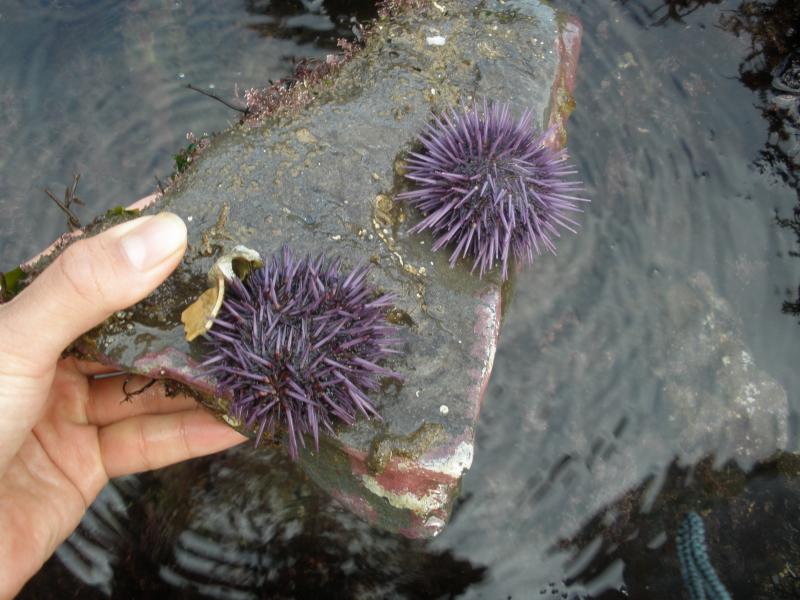 Image: bibliomaniac15 via Compfight cc
Image: bibliomaniac15 via Compfight ccLast week, one of our fabulous NCSE interns discovered a—shall we say, interesting?—article on both evolution and climate change from none other than the Institute for Creation Research. The article discussed research by scientists at the University of California, Santa Barbara, on the impact of ocean acidification of sea urchin adaptation. This research was a pretty clever study that demonstrated that certain populations of sea urchins might have the ability to adapt over multiple generations to changing ocean pH resulting from ocean acidification. The ICR article, though, seemed to miss the mark a bit as to what the researchers found.
In an article entitled, “Spiny Sea Creature Rapidly Accommodates Chemical Changes,” the ICR author dismisses the idea that the research involved evolution at all, claiming that it was consistent with the alternative hypothesis that “God created urchins with an inherent potential to adjust their internal machinery to accommodate pH (acidity) changes.” Sea urchins’ ability to adjust their internal machinery was actually not mentioned in the original study, as far as I could tell, making this a strange conclusion for the ICR author to reach. The article also stated that “the change precisely met the newfound need of the urchin offspring,” something that I failed to find mentioned in the original study either. Last, and most entertainingly, the article expressed skepticism that people had any effect on climate change at all, citing as evidence not any climate science research but a piece published in 2008 in the ICR’s own Acts & Facts.
So, to recap: in discussing a scientific research study that addressed potential impacts of climate change on animal adaptation, the ICR casually dismisses both evolution and climate change. Maybe not their best work.
But this isn’t my area of expertise—my background is in terrestrial ecology. Maybe I read the primary research wrong. So, being a bit of an investigator, I decided to go to the source.
The primary author, Morgan Kelly, is a postdoctoral scholar at UCSB studying the impact of ocean acidification on marine organisms. She was kind enough to sit down with me recently to set the record straight on her research.
Could you explain what your research was about and what was novel about these findings?
My research is focused on understanding whether short-term evolutionary change could provide some buffer to populations facing changes in ocean chemistry from ocean acidification. To address this question, I focused on purple sea urchins, which are an ecologically and economically important species.
Obviously to ask these types of questions, what you really want is a time machine and to go forward into the future to see if the animals adapt to future changes in pH. But since you can’t do that, the next best thing is to take them into the lab and do experiments that measure the amount of genetic variation that is present in the population.
We were looking for whether or not there was heritable variation for the response to low pH. So we took two populations back to the lab, did a big breeding experiment and reared larvae under high CO2 at conditions we expect about 100 years from now. Then we asked whether there was variation among families. If there is heritable variation in a trait you are interested in, you’ll tend to see a lot of variation among families in that trait.
So the good news for us was that you see a lot of variation among families of urchins in their response to CO2. This tells us that there is heritable variation for tolerance of low pH, which suggests that they have the potential for adaptation to low pH. Our research does not suggest that adaptation will erase the effect of ocean acidification, but it suggests that it may provide at least some buffer.
Could you explain how the ICR article misrepresented your results?
There were a couple problems with their interpretation of my research. First of all, there is a difference between the potential to adapt and having already done so. It seems that they have misinterpreted our findings to say that urchins have already adapted. That’s not what we were looking at.
By saying that urchins have an “inherent potential to adjust their internal machinery to accommodate pH” it sounds like they are actually talking about acclimatization. There is a difference between acclimatization that is happening in one generation versus adaptation that happens over multiple generations. Our research did not demonstrate acclimatization, but rather adaptation. It seems that they did not understand that.
They seem to also be misinterpreting the idea that if there is variation in a population, that all individuals have a high tolerance to a low pH. By stating as they did that “the change precisely met the newfound need of the urchin offspring,” they are suggesting that all the sea urchins responded the same way. When I talk about “variation” in a population, it means that some individuals are harboring tolerance while others are not. When there is a lot of variation, there are some on the beneficial side of the bell curve and there are some who are on the non-beneficial side. They seemed not to understand this.
What recommendations do you have for other scientists who find themselves in a similar situation with their work being misrepresented by creationists or climate change deniers?
There is a temptation when this happens to shut down a little bit and not get involved in outreach. But I think that cases like these really argue for the opposite. My recommendation is for scientists to get educated for effective public outreach and education. We need to try as much as possible to distill research findings into effective nuggets of information, but also not to obsess too much about the potential for misinformation. Bad experiences like this should not intimidate scientists from doing the best outreach they can.
Morgan Kelly will be continuing her research into the effects of ocean acidification on marine animals as a new assistant faculty member in the biology department at Louisiana State University. Kudos to her and we look forward to seeing what great research will be coming out of her new lab!

